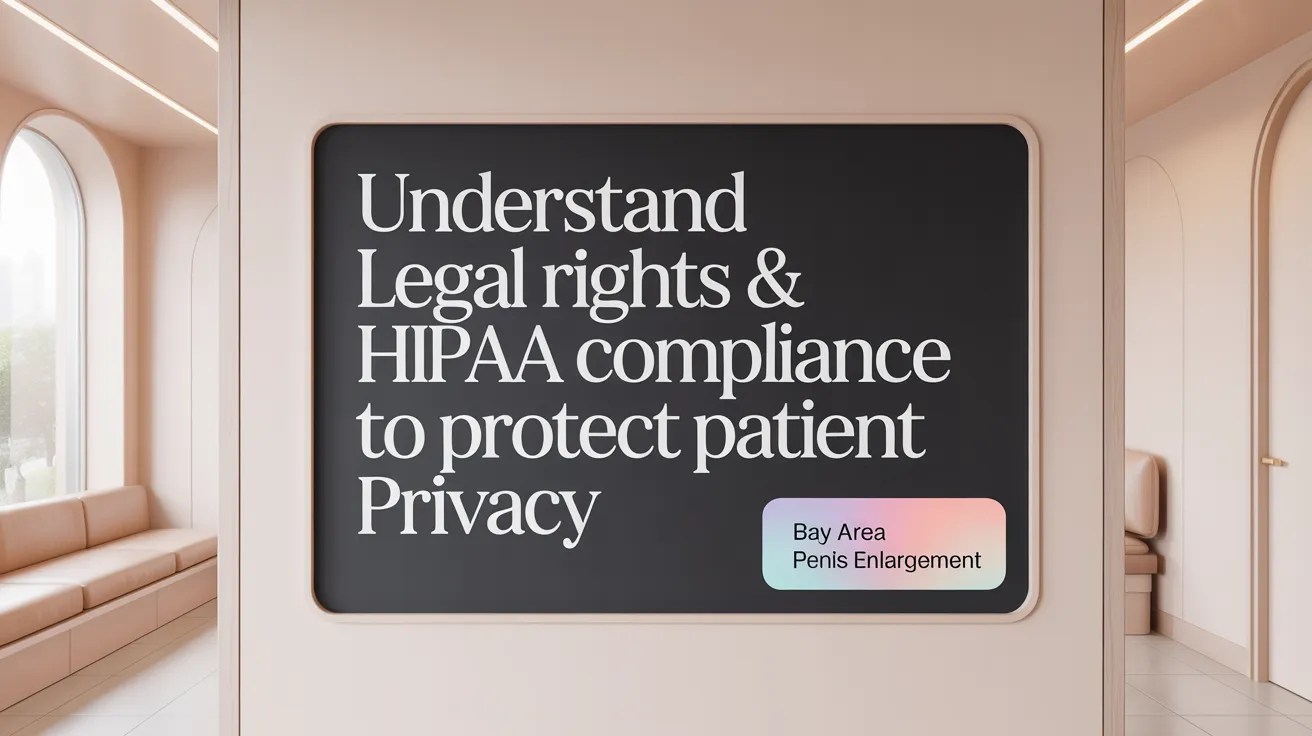Understanding Privacy Needs in Male Enhancement Treatments
Male enhancement treatments involve sensitive health information that requires stringent confidentiality safeguards. This article explores best practices, legal protections, and technological measures to uphold patient privacy, ensuring discretion and trust throughout the care journey.
Best Practices for Maintaining Patient Confidentiality in Male Enhancement Treatments

What are the best practices for maintaining patient confidentiality in male enhancement treatments?
Ensuring the privacy of patients undergoing male enhancement procedures involves multiple strategies aligned with health privacy regulations such as HIPAA. Healthcare providers should begin by securely storing all patient records, both physical and digital, to prevent unauthorized access. This includes utilizing encrypted systems for transmitting and storing protected health information (PHI) to safeguard against data breaches.
Implementing role-based access controls is another essential step. Such controls restrict sensitive information to only those team members who need it for their specific duties, reducing the risk of accidental disclosures.
Creating private and comfortable consultation environments is crucial. This helps assure patients that their discussions remain confidential, especially in sensitive matters like male enhancement.
Obtaining explicit informed consent before sharing or disclosing any personal health information is a fundamental practice. Patients should clearly understand what data is being shared, with whom, and for what purpose.
Staff training is vital—regularly educating healthcare workers on privacy policies and cybersecurity measures strengthens the organization’s overall security posture.
Routine risk assessments help identify vulnerabilities in data handling processes, while having a well-defined breach response plan ensures swift action to mitigate any damage caused by potential data leaks.
Working with vetted external vendors who comply with confidentiality standards also supports data integrity.
Finally, transparent communication about patients' privacy rights fosters trust. Patients should be informed about how their data is protected and encouraged to voice any concerns or questions.
| Best Practices | Description | Additional Notes |
|---|---|---|
| Secure Storage of Records | Use encrypted and secure filing systems | Physical and digital records |
| Digital Encryption | Encrypt communications and ePHI | Protects against cyber threats |
| Role-Based Access Control | Limit access based on job responsibilities | Prevents unnecessary data exposure |
| Private Consultation Environments | Ensure confidentiality during patient interactions | Use private rooms, soundproofing |
| Informed Consent Protocols | Explain data sharing and privacy measures clearly | Obtain written agreement |
| Staff Training | Regular education on privacy and cybersecurity | Includes updating policies |
| Risk Assessments and Breach Response | Identify vulnerabilities and prepare incident plans | Conduct periodic reviews |
| Patient Communication on Privacy Rights | Keep patients informed and empowered | Encourage questions and feedback |
Following these practices helps safeguard sensitive information, maintain patient trust, and comply with legal standards, ensuring that treatments are conducted with respect for patient confidentiality.
Legal Protections and Privacy Considerations for Male Enhancement Patients

What privacy protections and legal considerations apply to patients undergoing male enhancement treatments?
Patients receiving male enhancement treatments are protected under laws like the Health Insurance Portability and Accountability Act (HIPAA), which sets strict standards for the safeguarding of protected health information (PHI). These laws limit how healthcare providers can use and disclose sensitive information without the patient's explicit permission.
Healthcare providers must take steps to securely handle patient data. This includes implementing technical safeguards such as encryption, conducting regular risk assessments, and training staff on privacy practices to prevent unauthorized access.
Patients have important rights related to their PHI. They can request access to their medical records, request corrections, and control how their information is shared. Providers must obtain clear, explicit consent before disclosing sensitive information, especially in cases involving stigmatized treatments like male enhancement.
Legal considerations also involve complying with state and federal laws that might impose stricter privacy restrictions. For example, certain states have additional laws protecting sexual health information. Understanding when and how PHI can be shared is crucial. Common circumstances include treatment, billing, emergencies, and legal obligations.
Balancing the need for confidentiality with the necessity of care coordination is vital. While protecting patient privacy, healthcare providers also need to share information responsibly to facilitate effective treatment and ensure safety.
In summary, the legal landscape aims to protect patients' rights while allowing necessary communication among healthcare providers, maintaining trust and promoting ethical treatment practices.
Core Data Privacy Principles and Security Measures in Sensitive Healthcare
What data privacy principles and security measures are essential in healthcare for sensitive treatments like male enhancement?
In healthcare, especially for sensitive treatments such as male enhancement, safeguarding patient privacy is crucial. Fundamental principles include data minimization and purpose limitation, which mean only collecting essential information and using it solely for specified reasons.
Patient consent is vital, requiring clear communication about how data will be used and obtaining explicit approval before processing personal health information (PHI). This ensures respect for individual rights and builds trust.
Security measures involve advanced technologies like encryption for data in transit and at rest, which protects information from unauthorized access.
Multi-factor authentication adds an extra barrier for accessing sensitive data, requiring users to verify their identity through multiple steps.
Access controls should be strictly enforced, allowing only authorized personnel to view or modify PHI.
Regular risk assessments and audits help identify vulnerabilities and improve security protocols.
In the event of a breach, well-defined response plans are essential to contain damage, notify affected individuals, and comply with legal requirements.
Emerging technologies such as blockchain offer immutable records and enhanced security, while artificial intelligence (AI) can assist in detecting and preventing breaches.
Harmonizing regulations like GDPR in Europe and HIPAA in the US ensures consistent standards across borders, facilitating better protection and enabling secure international data sharing.
Implementing these principles and measures creates a secure environment for managing sensitive healthcare information, fostering patient confidence and complying with legal standards.
Ensuring Discretion and Confidentiality During Male Enhancement Procedures
How can healthcare providers ensure discretion and confidentiality during male enhancement procedures?
Healthcare providers play a crucial role in safeguarding patient privacy and maintaining trust during sensitive medical treatments such as male enhancement procedures. To ensure discretion, providers should conduct all consultations and procedures in private, soundproof rooms to prevent any unauthorized eavesdropping or overhearing.
Limiting access to protected health information (PHI) only to authorized personnel is vital. This involves strict access controls within digital health records and physical security measures for stored documents. Communication of sensitive details should be carried out via secure, encrypted channels to prevent interception by unauthorized parties.
It is recommended that all discussions regarding the procedure happen in private settings, whether at the clinic or via confidential telehealth sessions, avoiding public or crowded areas. Providers should also disclose only the necessary minimum of PHI needed for treatment or administrative purposes, following the principle of minimal disclosure.
Informed consent is essential for external disclosures of patient information, ensuring patients understand what info may be shared and with whom. Clear, understandable privacy notices should inform patients of their rights.
Secure storage of all records, both physical and digital, including encrypting electronic data and implementing secure filing practices, is necessary to prevent data breaches. Equally important are proper disposal methods, such as shredding physical documents and securely deleting digital records.
Staff training on privacy regulations, including HIPAA compliance, helps ensure staff understand confidentiality obligations. Performing regular risk assessments can identify potential vulnerabilities, while having well-established incident response protocols allows for quick action in case of data breaches or privacy violations.
Adherence to these measures not only fulfills legal and ethical standards but also reassures patients that their sensitive health information is protected effectively during and after male enhancement treatments.
Privacy Considerations in Telemedicine for Male Enhancement Care

What privacy considerations should be taken into account for telemedicine and remote consultations in male enhancement care?
When offering telemedicine services for male enhancement treatment, protecting patient privacy is of utmost importance. Healthcare providers should use secure, encrypted platforms that comply with standards like HIPAA to ensure that the data transmitted during virtual visits remains confidential. These platforms prevent unauthorized access and help maintain the integrity of sensitive health information.
Patients must be guided to conduct telemedicine sessions in private settings, such as a quiet room at home or a private clinic space. They should be advised to turn off electronic devices nearby and avoid using public Wi-Fi networks, as these environments increase the risk of information leaks.
Verification of patient identities is essential before discussing sensitive health matters. Providers are also responsible for obtaining informed consent that clearly explains how data will be protected, stored, and potentially shared, making sure patients understand their rights.
Staff training plays a crucial role in maintaining privacy. Healthcare teams should be trained on proper privacy practices, and security assessments should be conducted regularly to identify and mitigate vulnerabilities. When third-party vendors or cloud services are used, verifying their security measures and compliance with privacy laws is necessary.
Ongoing communication with patients about potential privacy risks builds trust. Patients should be encouraged to report any concerns or suspected breaches immediately. By taking these steps, clinicians can ensure that remote male enhancement treatments are privacy-friendly, fostering confidence in telehealth as a secure mode of care.
Patients’ Rights and Privacy Laws in Male Enhancement Healthcare

What are patients' rights and relevant privacy laws related to male enhancement healthcare services?
Patients in male enhancement healthcare have important rights that help protect their personal information and control over their data. They can access their medical records, review treatment information, and request changes if needed. Patients are also entitled to know how their health data is being used and shared.
The main laws that support these rights include the HIPAA Privacy Rule, which sets national standards for protecting protected health information (PHI). This law limits the use of PHI to authorized purposes such as treatment, billing, and healthcare operations. Patients can request restrictions on who can see their sensitive information and ask for an accounting of disclosures. If they believe their privacy has been violated, they can file a complaint with the relevant authorities.
Healthcare providers and organizations must implement safeguards to keep patient data confidential. This includes protecting electronic protected health information (ePHI) through security measures like encryption and restricted access. Specific consents or notices are often required before disclosing sensitive details, such as psychiatric or HIV status, ensuring patient permission is obtained while respecting legal standards.
Overall, these privacy rights empower patients in male enhancement healthcare to make informed choices and maintain control over their sensitive health information.
Policies and Guidelines for Protecting Sensitive Health Information in Male Enhancement Care

What policies and guidelines help protect sensitive health information in male enhancement care?
Protecting personal health information (PHI) in male enhancement treatment involves strict adherence to established privacy standards. Central to these are the HIPAA Privacy and Security Rules, which set national benchmarks for safeguarding health data.
Healthcare providers and organizations are required to develop comprehensive policies that detail how sensitive information is handled, stored, and shared. These policies are reinforced through regular staff training, ensuring everyone understands their role in maintaining confidentiality.
Designated privacy officers oversee compliance with these policies, performing routine audits and ensuring policies are up to date with evolving legal standards.
Technical safeguards are a critical component. These include encryption of digital data, access controls, audit logs, and secure network protocols to prevent unauthorized access or breaches. Physical safeguards such as secure storage for paper records and restricted access to treatment areas are also essential.
Patients possess rights to access their health information, request amendments, and control disclosures, fostering transparency and trust.
Regular risk assessments help identify potential vulnerabilities in data handling, allowing organizations to implement mitigation strategies proactively. Incident response plans ensure swift action if a breach occurs.
Legal compliance is enforced through ongoing monitoring and accountability measures. Violations resulting in data breaches or unauthorized disclosures can lead to significant penalties, underscoring the importance of stringent privacy practices.
By integrating these guidelines, male enhancement care providers can uphold the confidentiality of sensitive health data and promote patient trust and safety.
Emerging Privacy Challenges and Innovations in Sensitive Healthcare Data
Privacy risks of patient portals and mHealth applications
Patient portals and mobile health (mHealth) apps provide convenient access to health information but also pose privacy challenges. Unauthorized access to protected health information (PHI) can happen if security measures are weak. Patients worry about third-party use of their data, potential discrimination, and misuse. These platforms often carry sensitive personal data, making them attractive targets for breaches.
Use of encryption and privacy policies in health apps
To address these concerns, many health apps implement encryption, such as SSL, to secure data during transmission. They also develop privacy policies that clearly state how personal data is collected, used, and stored. Best practices include regular security updates and transparent user agreements to build patient trust.
Risks from media sharing and crowdsourcing health data
Sharing health images or videos on social media or crowdsourcing platforms can unintentionally expose personal health details. Removing metadata and obtaining explicit consent help reduce risks of re-identification or misuse. Crowdsourcing can enhance medical research but must balance data sharing with confidentiality.
Ethical concerns regarding AI avatars and virtual agents
Virtual health assistants and AI-powered avatars are increasingly used in health education and therapy. While they offer personalized support, they raise privacy and rights issues. Defining standards and ethical guidelines is essential to ensure these tools protect user confidentiality and avoid misuse.
Standards and ethical considerations for technological tools
Implementing technology in healthcare demands adherence to strict privacy standards. This includes encrypting data, obtaining informed consent, and complying with regulations like HIPAA and GDPR. Regular audits and impact assessments help maintain ethical integrity and safeguard patient trust.
Maintaining trust and informed consent
Building trust requires transparent communication about data practices. Patients should be informed about how their data is used, stored, and shared. Explicit consent must be obtained for processing sensitive health information, especially for emerging tools like crowdsourcing and AI avatars.
| Aspect | Concern | Privacy Measures | Regulations/Standards |
|---|---|---|---|
| Patient portals & mHealth | Unauthorized access, misuse | Encryption, privacy policies | HIPAA, GDPR |
| Media sharing & crowdsourcing | Re-identification, data misuse | Metadata removal, explicit consent | Data protection laws |
| AI avatars & virtual agents | Confidentiality, ethical use | Standards, ethical guidelines | Industry-specific standards, GDPR |
| Overall technological tools | Data security, user trust | Regular audits, impact assessments | HIPAA, GDPR, local data regulations |
Effective management of healthcare data privacy involves implementing robust security measures, maintaining transparency, and adhering to regulations. As technology advances, continuous assessment and ethical mindfulness are essential to protect patient trust and confidentiality.
Building Trust Through Robust Privacy Practices
Maintaining privacy and confidentiality in male enhancement healthcare is critical to patient trust and quality care. By implementing comprehensive best practices, adhering to legal and regulatory frameworks, utilizing advanced security technologies, and addressing emerging challenges, healthcare providers can ensure sensitive information remains protected. Encouraging patient awareness of rights and fostering open communication further solidify privacy as a cornerstone of ethical male enhancement treatment. Continuous vigilance and adaptation to evolving privacy standards will empower patients to confidently seek necessary care without fear of privacy breaches.
References
- Protect Patient Confidentiality and Access to Treatment
- HIPAA Privacy Rule Final Rule to Support Reproductive ...
- GDPR Compliance for Healthcare
- Balancing Between Privacy and Patient Needs for Health ...
- Privacy in Telemedicine: 5 Things You Should Know as a ...
- Summary of the HIPAA Privacy Rule
- Your Rights Under HIPAA
- Your Patient Privacy Rights: A Consumer Guide to Health ...

